Questionhey, I'm gona get my ferret tomorrow and i don't know what to expect.and i dont know what to have ready at home before i bring him home.i went to check him out the other day he is 3mthns old and he bites allot but it doesn't hurt.if you have any tips i can use and a list of stuff to get it will be very helpful thank you.im from Malaysia btw
AnswerHi Moe:
Congratulations on your new ferret! I hope you've done your homework and made SURE that a ferret is the right pet for you. We usually find that most people who would LIKE to have ferrets unfortunately aren't prepared for the amount of work and time commitment that having a ferret requires. It's always fun having a little one in the house! You did say a boy? If you're not sure how to tell if he/she is a boy or girl....look at the ferret's tummy. If you see something that looks like a bellybutton, you have a male ferret. That's his penis. If you don't see a bellybutton, you have a female ferret. Another way to tell them apart - when boy ferrets pee, it's about two or three inches in front of where they poop (because their penis is several inches from their anal opening). When little girl ferrets go potty, the poop and pee pretty well ends up all in one place (because her urethra is right next to her anus). Sometimes people can have ferrets for months - even name them - only to find out that they have a girl, not a boy; or the other way around. So, you will know exactly what you have from the beginning and that will give you a head start in your ferret knowledge!
There are just SO many things that a new ferret owner needs to learn. It's usually best to learn as much about ferrets BEFORE getting one as possible; so you can tell if it is going to be too much trouble or take too much of your time. But, if the ferret is on its way (home) to your house, you will have to do the next best thing and that is to read and study double-time in order to keep up with all your ferret will be getting into.
The most important thing - preferrably BEFORE you bring the ferret home - is to FERRETPROOF the area of the house where your ferret will be allowed to play. We usually start with a small room, especially for kits (babies) because they need to learn to go to the litterbox to go potty. If they are put in a big room, chances are not very good they are going to find a little litterbox with so many other things to explore. Start in a small room (usually the bathroom floor). Every time the ferret starts to back up to go potty, gently pick it up and place it in the litterbox until it gets the idea. You can also put poops in the litterbox so the ferret sees/smells it there and hopefully makes the connection; when the ferret is litterbox trained for that size room, you can go to another room (maybe a small bedroom) that has been FERRETPROOFED and is safe for the ferret to play with you in. Put TWO litterboxes in this room and watch that your ferret uses them; Continue like this until you are sure your ferret is litterbox trained AND whatever room/s you have decided on that the ferret is going to be playing in. It's IMPERATIVE that you FERRETPROOF thoroughly for your ferret's safety. So many simple household items are dangerous for ferrets! Here are a few websites to help you ferretproof well:
FERRETPROOFING (do this BEFORE bringing a ferret home if possible):
* http://www.ferretcentral.org/faq/part2.html#ferretproofing
* http://groups.msn.com/Ferret/yourwebpage10.msnw
* http://groups.msn.com/Ferret/ferretproofing2.msnw
One other important note - don't forget her distemper and rabies shots. Since distemper is SO contagious that you can even bring it into your house on your shoes, please don't forget to get these. Hopefully you've already located a vet there who can help you with your little one. It may be difficult where you are, but I would think that any vet who could take care of young kittens would be able to help your ferret. Stay at the vets for at least 20-30 mins after each shot to be sure he isn't going to have a reaction. Check to be sure, but he PROBABLY had the first shot before leaving the breeder, so he will need additional distemper shots at 12 and 16 weeks; then a rabies shot about two weeks later; then yearly boosters from then on. DO have the vet give your ferret a benadryl injection before each immunization AND never get a rabies and distemper shot at the same time. Hopefully your vet will stay on top of this for you, but ultimately you are responsible for your ferret's welfare, so keep thorough records, especially if you travel a lot; you may NEED copies of vet records/immunizations, etc at any time. Keep a file especially for the ferret.
I highly recommend the book FERRETS FOR DUMMIES by Kim Schilling - it covers all the basics that EVERY ferret parent, both new and old, need to know to keep their ferrets safe and happy.You can get it on http://www.half.com and I'm sure someone will ship to Malaysia if you can't get a copy locally.
Some ferrets tend to chew on their owners than others. You do need to eliminate this while the ferret is young. You may try something like Ferretone on your hands to get the ferret to lick you and understand that you are not another ferret to bite on. Kits often don't have the understanding and think we're just large ferrets (who have very tough skin) so they can play hard. ALL ferrets love feet, shoes, socks - so you must keep shoes (especially those with foam rubber insoles...insoles are the WORST because ferrets LOVE them and EAT them, then they get intestinal blockages and die) out of their reach! You can take some old socks and stuff them with a plastic medicine bottle with a few pieces of macaroni in it (to make noise) and roll it around for him to play with - he will love the sock and the noise.
Kits are sometimes difficult to interract with; which is why I usually recommend older ferrets for first time owners - older ferrets are just slower and easier to work with. With kits, you have to get their attention before you can do anything with them, but they can be a bundle of fun once you get it figured out. There is LOTS for you to read here:
http://www.ferretcentral.org and click on FAQs and just start reading.
As far as the cage - it needs to be at LEAST 2'x3'x3'. It would be best for him if the litter BOX has either Yesterday's News compressed newspaper pellets, OR a regular (NOT clumping) litter. Then place any 'oops' poops in the box so he understands that's where it goes. Remove all food, water, and bedding from the litter area; they don't like to have any of these things near where they potty. In the area of the cage for eating and drinking - I recommend both a water bottle AND a water dish underneath the bottle, to catch any drips. The water dish needs to be washed and refilled AT LEAST once a day, and the water bottle needs to be emptied and cleaned with a very weak bleach solution, rinsed over and over and over until there is no 'bleachy smell' left, then refill it. Food needs to be nearby in a dish.If it's right next to it, he will drop pieces of food in and the water will need to be changed a LOT more often, so spread them apart just a little bit, maybe with the water BOTTLE next to the food bowl, the water bowl on the other side is what I'd recommend.
It is IMPERATIVE that your ferret have a good protein rich diet from ANIMAL SOURCES. If you can't get premium ferret foods like Totally Ferret where you are, hopefully you can get SOME food that's listed on the ferret food list (below) OR even feed your ferret a natural prey diet - 'feeder mice' are great; give them to the ferret alive and about twice a week. If the ferret gets used to this from a young age, it is much healthier for the ferret than kibble. Some ferrets, however, just will not kill or eat live prey of any kind. All ferrets who eat kibble seem to crunch their food, then leave the little crumbs that break off behind... they just won't eat - get used to it and when the dish contains mostly crumbs, just dump it, wash the bowl and refill with fresh food (preferrable a quality food like Totally Ferret or other high protein food specifically for ferrets. There is a chart to choose the best ferret foods here:
http://www.ohioferret.org/INFO/nutri_prn.asp
Ferrets are obligate carnivores, which means they MUST eat meat and kibble made of meat only - treats should also be meat, NO fruits, NO vegetables, NO dried fruits or vegetables or any treat that has those products in them (BEWARE of Kaytee Fiesta Food! - if is commonly referred to as "Blockage in a Bag" by experienced ferret owners because it is known for causing intestinal blockages). Be sure you know the symptoms of an intestinal blockage (this is part of the reading and learning you MUST do as a responsible ferret parent :-)
Bedding should be soft fabrics, NOT wood chips or similar, and they must be laundered at least once a week. Ferrets LOVE your pajamas, tee shirts, sweats, or get some little baby receiving blankets and/or fleece blankets for wintertime from a thrift store for very reasonable prices - there are a ton of beautiful and perfect ferret sleeping hammocks, cubes and tubes available on eBay. All summertime bedding should be lightweight.
Ferrets CANNOT be kept in temperatures over 82 degrees - or in the sun - in summertime, so do be careful of that. FANS DO NOT HELP ferrets unless you have some form of water in the cage/on the ferret; fans only work when they cause sweat evaporation from the skin and ferrets don't sweat. So, you must keep the temperature under 82 degrees AND/OR keep the ferret wet and a fan on it; OR keep wet sheets on the cage and a fan aimed at it so the evaporating water keeps the ferret's area cool. If a ferret starts panting, it is an emergency and you MUST cool the ferret down immediately - put him in lukewarm water, so as not to shock him, offer him a cool drink and get near a fan while he is drying - then get him to a cooler place.
Keep the eating, sleeping and litter areas separate in the cage; stick a few *safe* (no rubber or small parts that will come off like noses, etc - just like you would for a very young child), things that make noise like hard balls with bells in them, teddy bears that make noise when touched - that kind of stuff - in the cage. Ferret kits (babies) have a LOT of energy and need a MINIMUM of three hours out of the cage daily and THEY MUST BE SUPERVISED during this time. You will soon become your ferret's favorite toy! :-)
I strongly encourage you to read all you can on http://www.ferretcentral.org AND to get the book FERRETS FOR DUMMIES and read it cover to cover - your ferret will live a longer, happier life for it. Best of luck and don't forget the Ferretone (an oil in a brown bottle at the pet store that ferrets LOVE) on your hands when playing with him in the early days together - he will understand that hands are *good* things in no time at all. He *may* always bite feet......ferrets are famous for that and shoes, so be sure all shoes are up and out of his reach - for HIS safety. Read a LOT, and have a LOT of FUN - your ferret is depending on YOU to keep him safe and his environment SAFE to play in!
Sincerely,
Jacquie Rodgers

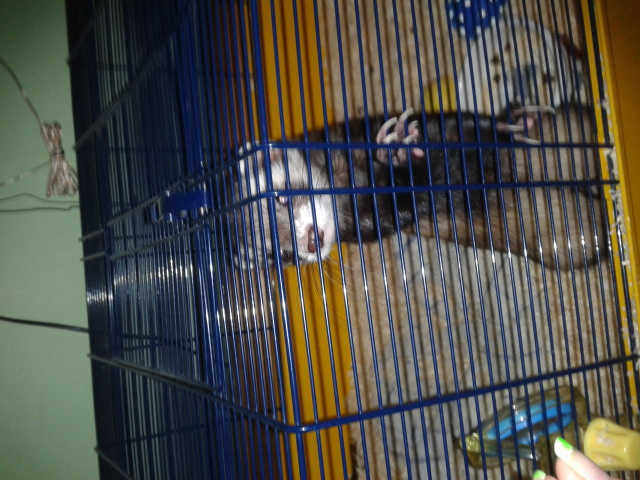 ferret has gone very strainge
Question
striders great escape
Please help i hav
ferret has gone very strainge
Question
striders great escape
Please help i hav
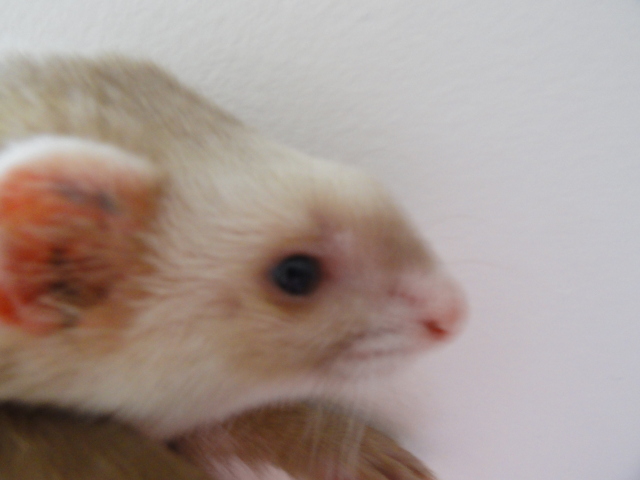 Bump on the noggin
Question
Bump above the eye
Yesterday,my ferret was fin
Bump on the noggin
Question
Bump above the eye
Yesterday,my ferret was fin
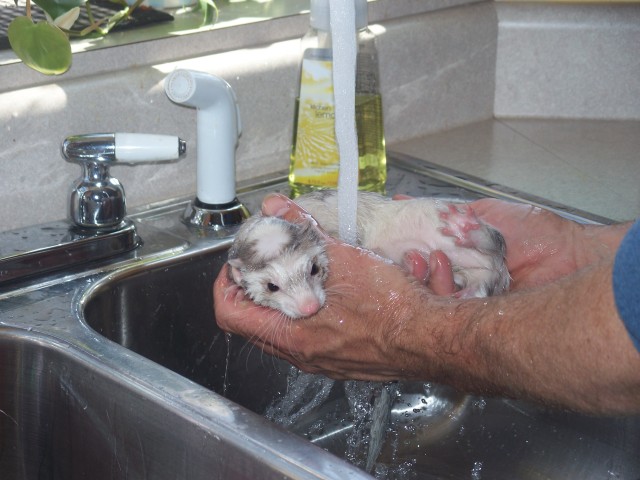 Concerns with Molly
Question
Molly when we firat go
Hello, I have a girl fe
Concerns with Molly
Question
Molly when we firat go
Hello, I have a girl fe
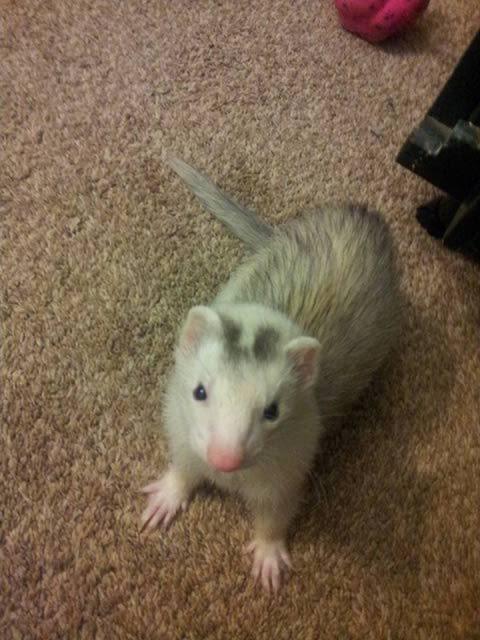 ferret loneliness
Question
Mostar
I am a new owner of a single fer
ferret loneliness
Question
Mostar
I am a new owner of a single fer
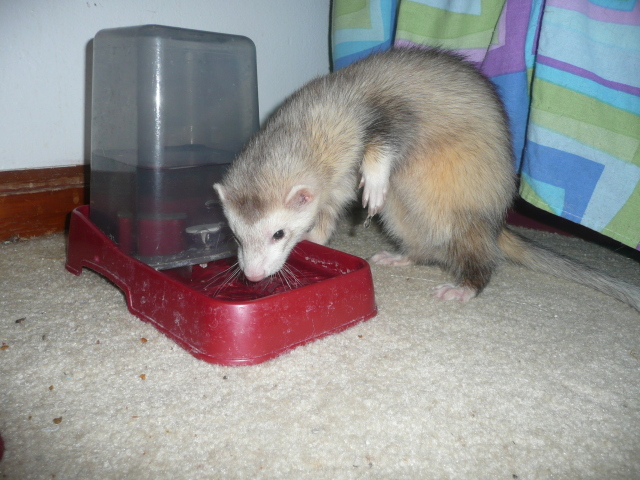 Ferret colors
Question
Mitch
Hello Cindy!
I have just adopted a new
Ferret colors
Question
Mitch
Hello Cindy!
I have just adopted a new